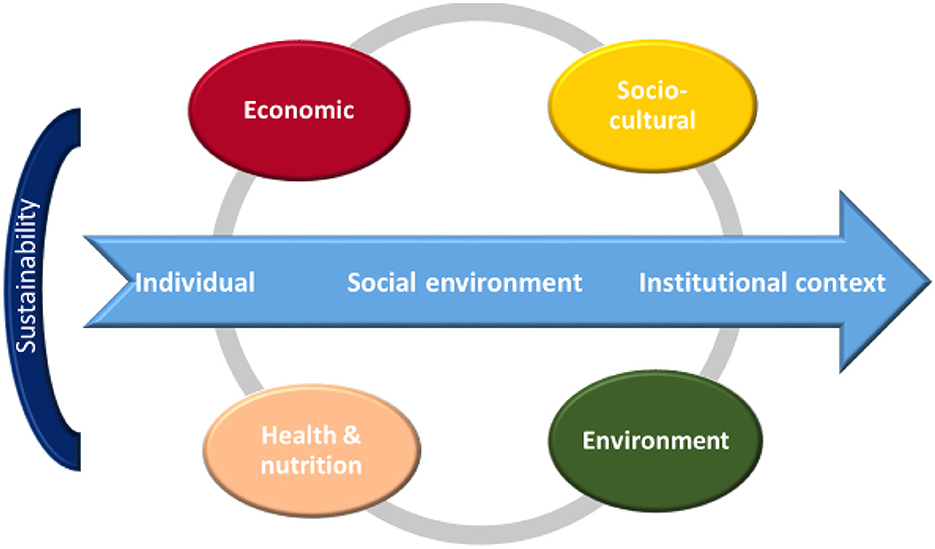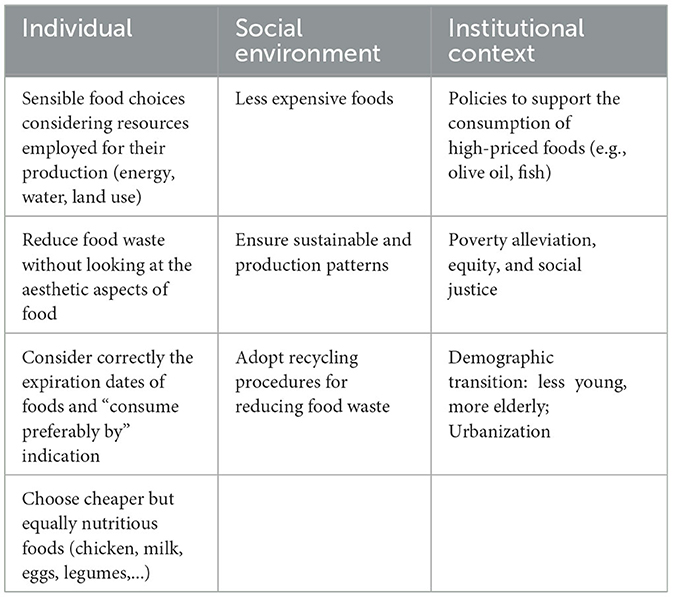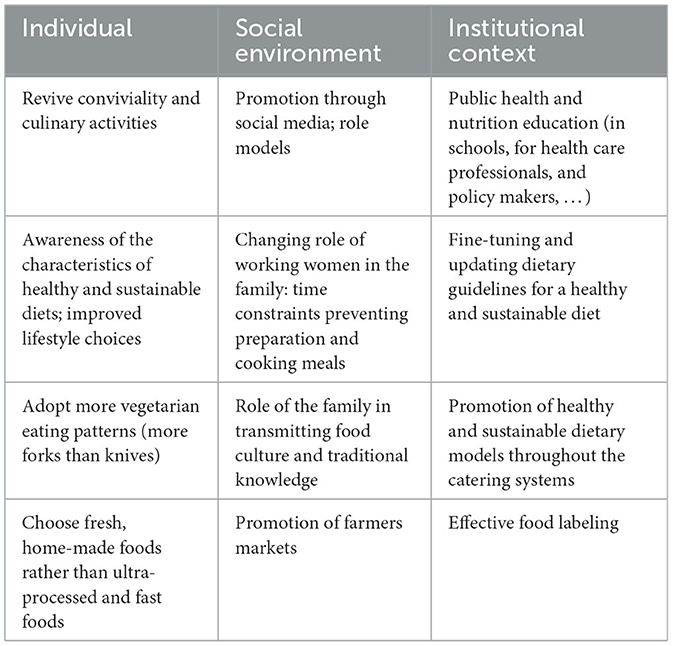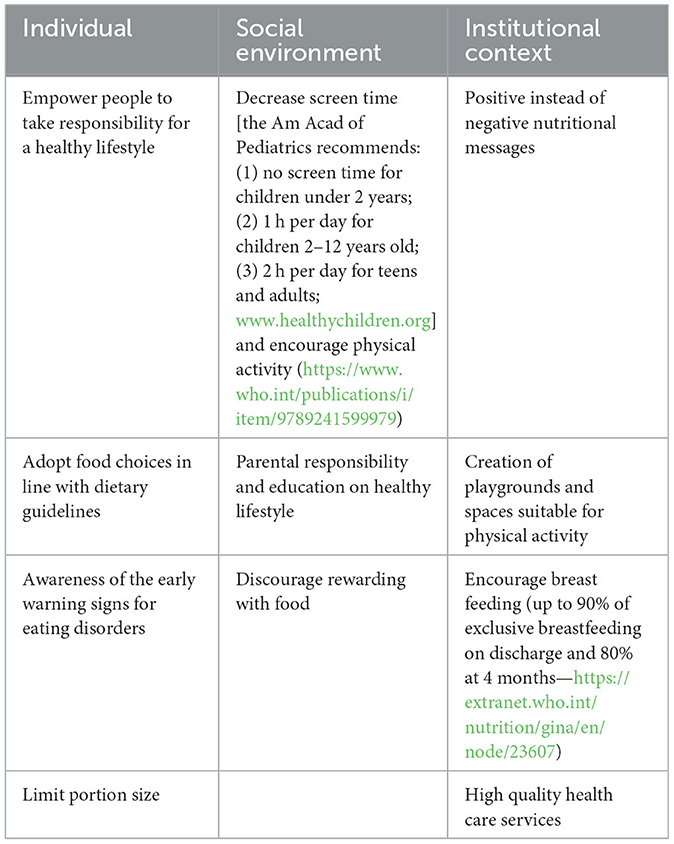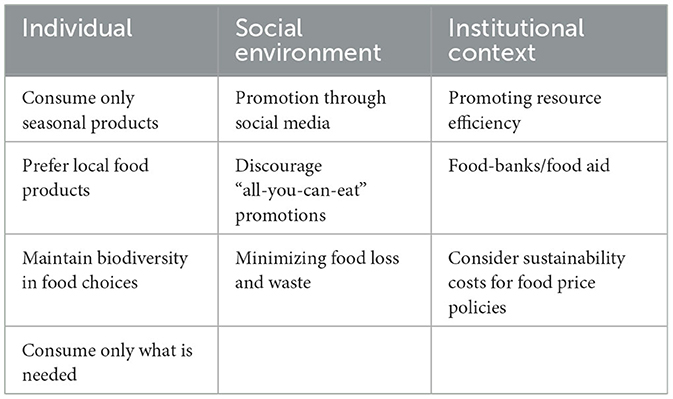- 1Department of Experimental Medicine, Food Science and Human Nutrition Research Unit, Sapienza University of Rome, Rome, Italy
- 2Braun School of Public Health, Hadassah Medical School, Hebrew University, Jerusalem, Israel
Introduction
In spite of the very many papers indicating that the Mediterranean Diet (MD) is one of the most healthy and sustainable eating patterns, adherence to it diet is diminishing in most Mediterranean countries.
In the study published by Vilarneau et al. the adherence to the MD over a 50-year period (1961–1965 to 2004–2011) in 169 countries declined in most countries (overall from 2.86 to 2.03 according to the Mediterranean Adequacy Index) in particular the Mediterranean Europe, Southern Mediterranean, and Central Europe countries. These regions have undergone significant cultural, social and political changes, which may have influenced the dietary transition and changes in food habits. Moreover, different studies reported an association between adherence to the MD and socioeconomic factors, with greater wealth being associated with increased adherence to the MD (1–3).
There is therefore a necessity to “revitalize” the MD and to return to a model that is considered a reference for all nutritional guidelines throughout the world (4).
The term sociotype describes the reciprocal relationship of an individual with the social environment during life. The sociotype is a theoretical ecological framework to emphasize the bio-psycho-social and environmental factors involved in coping with life stresses (e.g., food insecurity) (5) and patient self-management for chronic illness such as diabesity (6). The sociotype is a framework for helping in coping with different life challenges (7): it has been used for food security (5) and also during the recent COVID shutdown (8). All three domains are involved to different extent in these situations depending on the person and the issues involved. The three domains of the sociotype refer in this paper to: Individual, Relationships/Social environment, and Institutional Context.
The sustainability of the MD has been defined through four dimensions: socio-cultural, economic, environmental, health-nutritional (9). Enhancement of adherence to the MD and its eating pattern should consider (Figure 1):
1) its longitudinal vector—involving the individual called to make healthy and sustainable choices, the family/social relationships and living environment in which these choices must be favored, and the institutional context necessary to promote a such a model for people and the planet and
2) its transversal vector—involving the four domains of sustainability: socio-cultural, economic, environmental, health-nutritional dimensions. Together, these can represent important driving forces to improve adherence to the Mediterranean eating pattern.
The aim of this article is to discuss promoting adherence to the MD by considering the four dimensions of sustainability in an integrating bio-psycho social and sociotypic approach (10).
Sustainable development—The economic dimension
The economic dimension of sustainability deals with the economic conditions of stakeholders, and on economic systems at local, national, regional and global levels (11). It includes:
1. Economic functioning (generated and distributed economic values).
2. Market presence (wages and social benefits by gender, employment opportunities, number of senior management hired from the local community).
3. Indirect economic impacts (development of infrastructure investments and supported services).
4. Procurement policies (proportion of expenditure on providers at key locales).
It has been shown that MD has signficant economic benefits due to its beneficial influence on the prevention of non-comunicable chronic diseases (12), including obesity, some cancers and degenerative neurological diseases, and thereby reducing health expenditure for individuals and health care systems.
A MD based on local foods promotes the economic valorisation of territories and will keep their traditional products linked to history and culture, thereby boosting business both for local producers and distributors.
In particular, recently, the idea of eating food grown and produced locally has gained much attention since it reduces the environmental and economic impacts of transportation, with a reduction of household spending, and increasing the nutritional value of foods (in particular fruits and vegetables) (13).
The sociotypic approach to enhance the adherence to MD, considering in particular the economic dimension of MD, includes individual commitment, interventions engaging the social environment, and the institutional context as described in Table 1.
Sustainable development—The socio-cultural dimension
The social dimension of sustainability is based on equal opportunities for all to healthcare and an adequate level of education. Equality and the refusal of any form of discrimination together with the warranty of peace, all contribute to a socially sustainable development. Food security is an essential part of this feature of sustainability.
Social aspects of sustainability are tightly linked to cultural dimensions. A sustained level of culture and (5, 14) traditional knowledge is in fact absolutely necessary to ensure sustainable development, to find the right solutions that align economic considerations with environmental protection and influence politics at a national and international levels (15).
The report “Culture in the implementation of the 2030 Agenda” (https://agenda21culture.net/sites/default/files/culture2030goal_high.pdf) provides key recommendations for all parties involved in the Implementation Decade (2020–2030) of the Sustainable Development Goals (SDGs) considering:
1. including cultural aspects initially in national frameworks for implementing the SDGs;
2. the importance of local culture in the implementation of the SDGs and the critical roles played by the civil society, institutions, and organizations;
3. commitment to developing multi-level partnerships to strengthen the integration of the cultural dimensions of the SDGs.
Territorial diets, such as the MD, are by nature related to specific geographic regions which have over time, assimilated other influences through the transfer of people material and cultural merchandise, including victuals. In keeping with the local cultural, socio-economic, and environmental contexts, territorial diets are linked not only to the biophysical reserves (soils, microclimates, landscape) that define agriculture and economic practices, but also to particular historical contexts, ecologies, and socio-cultural resources including institutions, and traditional knowledge. Examples of such territorial diets include: The Japanese Diet, the Mediterranean Diet, the Traditional Nordic Diet, and the New Nordic Diet (16).
The MD promotes:
• awareness of the local terroir, seasonality, and biodiversity
• traditional and local foods and culinary activities;
• social interactions through conviviality;
• awareness of the entire historical and cultural heritage of the MD—which is s a dietary tradition passed on from generation to generation.
The sociotypic approach to enhance the adherence to MD, considering its the socio-cultural dimension, includes its three domains described in Table 2.
Sustainable development—The health and nutrition dimension
Much research has considered the environmental impacts of various diets, concluding that a plant-based diet, with less animal-sourced foods confers both improved health and environmental benefits—as encouraged by the motto “more forks than knives.”
A healthy diet should optimize health, as defined by a state of complete physical, mental, and social wellbeing and not merely the absence of disease. Healthy diets, such as the MD, have an optimal caloric intake and consist of a wide range of plant-based nutrients, low amounts of animal foods, containing more unsaturated than saturated fats, and with limited amounts of refined grains, highly processed foods, and added sugars (17).
Very many scientific papers (18–21) have demonstrated the health benefits of MD through the prevention of cardiovascular and metabolic diseases, cancer, and depression while slowing the degenerative processes related to aging. In particular Sofi et al. have shown analyzing a global population of nine cohort studies including 514,118 subjects, an increase of two points in the adherence score determined an 8%-protection against a premature death (RR: 0.92, 95% CI 0.90–0.94, P < 0.0001) (21, 22).
The sociotypic approach to enhance the adherence to MD, considering in particular the health and nutritional dimension of MD are listed in Table 3.
Sustainable development—The environmental dimension
The food chain has important impacts on the environment through the release of huge amount of carbon dioxide (CO2) into the atmosphere, together with water, soil, land use, and energy consumption (23). Moreover, the production of foods has led to deforestation of large parts of the planet while, pari passu, biodiversity of plants and animals used for human nutrition has decreased. This has been caused by a progressive homogenisation of eating habits all over the world, and to the lobbying to increase live-stock and the productivity of the agricultural system.
Moreover, in this Anthropocene epoch, the global food system must operate to optimize human wellbeing and food production to ensure, from sustainable food systems, healthy diets for nearly 10 billion people by 2050, while guaranteeing food security, without negatively impacting on the environment. Finally, it is estimated that around a third of the global food production is lost throughout the entire food chain, equally distributed during the production process, along the transportation/conservation/transformation procedures and the consumption sites (including households; https://www.fao.org/in-action/seeking-end-to-loss-and-waste-of-food-along-production-chain/en/).
The MD, as a plant-based dietary model, has demonstrated its environmental benefits that are linked to the reduced use of natural resources (water, soil) and the reduced GHG emissions (13). The use of seasonal products, which is one of the cornerstones of the MD, may contribute to reduce environmental impact of food chain (reduction of greenhouse crops and transport costs from distant countries) and to the preservation/increase of biodiversity (safeguarding small producers, different sowing, and rotation of crops). Frugality (consumption of moderate portions, and of fresh, minimally processed foods) and culinary activities and recipes (in many cases based on the recycling of foods) typical of the MD may contribute to the reduction of food waste.
The sociotypic approach to enhance the adherence to MD, considering the environmental dimension of MD, is described in Table 4.
Conclusions
The bio-psycho-social and sociotypic approach to the multi-faceted nature of the MD can enable nutritionists and policy makers to focus on the different domains—Individual, Living/Social environment, and Institutional contexts—to make practical actions to improve the adherence to the Mediterranean diet and lifestyle.
The concepts discussed in this article may be translated into policy decisions at the Institutional—Context level as follows (24):
1) Ensure that Food Systems are Sustainable along the entire food chain—from production to consumption; reduce food losses and waste. Involve multi-stakeholder partners. systemic policies designed to recognize food systems as complex adaptive systems (25).
2) Promote agriculture toward the best Sustainable Ecosystem services and practices. Reduce the use of pesticides and fertilizers (26).
3) Ensure the right of all members of the population to healthy, adequate, and affordable food.
4) Monitor regularly the safety of the food supply chain to be environmentally friendly and free of pathogens.
5) Legislate (and incentivize) the Food Industry to produce healthy (minimally processed foods), with less added sugars, trans fats, salt, and additives. Informative Labeling (27, 28). Ensure honest and transparent marketing with. No junk food adverts to children
6) Improve Public Health Education on healthy life styles, nutrition, cooking (Mediterranean Diet Patterns), and physical activity.
Once these policies are set in place, then implementation will follow by improving the living/social environment (relationships) and ensuring a healthy, safe external environment (institutional context) to affect the individual and, thereby, enhance adherence to the Mediterranean diet (29).
Finally, we note that diets should not be a list of do's and don'ts, but rather a pleasurable and tasty experience (Individual) in which we respect traditional and cultural preferences (Social Environment). We have to eat to live and not vice versa.
Author contributions
LD and EB together conceived and developed the concept and contributed to the final manuscript. All authors contributed to the article and approved the submitted version.
Funding
LD acknowledges the support of grant PE00000003 (decree 1550, 11.10.2022) ON Foods—Research and innovation network on food and nutrition Sustainability, Safety and Security—Working ON Foods) from the Italian Ministry of University and Research (CUP D93C22000890001) under the National Recovery and Resilience Plan (NRRP), funded by the European Union-NextGenerationEU.
Conflict of interest
The authors declare that the research was conducted in the absence of any commercial or financial relationships that could be construed as a potential conflict of interest.
Publisher's note
All claims expressed in this article are solely those of the authors and do not necessarily represent those of their affiliated organizations, or those of the publisher, the editors and the reviewers. Any product that may be evaluated in this article, or claim that may be made by its manufacturer, is not guaranteed or endorsed by the publisher.
References
1. Vilarnau C, Stracker DM, Funtikov A, da Silva R, Estruch R, Bach-Faig A. Worldwide adherence to Mediterranean diet between 1960 and 2011. Eur J Clin Nutr. (2019) 72(Suppl. 1):83–91. doi: 10.1038/s41430-018-0313-9
2. Dinu M, Pagliai G, Giangrandi I, Colombini B, Toniolo L, Gensini G, et al. Adherence to the Mediterranean diet among Italian adults: results from the web-based Medi-Lite questionnaire. Int J Food Sci Nutr. (2021) 72:271–9. doi: 10.1080/09637486.2020.1793306
3. Dinu M, Tristan Asensi M, Pagliai G, Lotti S, Martini D, Colombini B, et al. Consumption of ultra-processed foods is inversely associated with adherence to the mediterranean diet: a cross-sectional study. Nutrients. (2022) 14:2073. doi: 10.3390/nu14102073
4. Sikalidis AK, Kelleher AH, Kristo AS. Mediterranean diet. Encyclopedia. (2021) 1:371–87. doi: 10.3390/encyclopedia1020031
5. Peng W, Dernini S, Berry EM. Coping with food insecurity using the sociotype ecological framework. Front Nutr. (2018) 5:107. doi: 10.3389/fnut.2018.00107
6. Berry EM, De Geest S. Tell me what you eat and I will tell you your sociotype: coping with diabesity. Rambam Maimonides Med J. (2012) 3:e0010. doi: 10.5041/RMMJ.10077
7. Berry EM, Bachar E, Baras M, De Geest S. Correlates of coping based on the concept of the sociotype: a secondary data analysis of an Israeli National Survey. Health Psychol Behav Med. (2017) 5:177–96. doi: 10.1080/21642850.2017.1286497
8. Peng W, Berry EM. Coping with the challenges of COVID-19 using the sociotype framework: a rehearsal for the next pandemic. Rambam Maimonides Med J. (2021) 12:e0005. doi: 10.5041/RMMJ.10425
9. Dernini S, Berry EM, Serra-Majem L, La Vecchia C, Capone R, Medina FX, et al. Med Diet 4.0: the Mediterranean diet with four sustainable benefits. Public Health Nutr. (2017) 20:1322–30. doi: 10.1017/S1368980016003177
10. Berry EM. Sustainable food systems and the Mediterranean diet. Nutrients. (2019) 11:2229. doi: 10.3390/nu11092229
11. Rezaee Z, Tsui J, Cheng P, Zhou G. Business Sustainability in Asia: Compliance, Performance, and Integrated Reporting and Assurance. John Wiley & Sons (2019).
12. Dinu M, Pagliai G, Casini A, Sofi F. Mediterranean diet and multiple health outcomes: an umbrella review of meta-analyses of observational studies and randomised trials. Eur J Clin Nutr. (2018) 72:30–43. doi: 10.1038/ejcn.2017.58
13. Serra-Majem L, Tomaino L, Dernini S, Berry EM, Lairon D, Ngo de la Cruz J., et al. Updating the mediterranean diet pyramid towards sustainability: focus on environmental concerns. Int J Environ Res Public Health. (2020) 17:8758. doi: 10.3390/ijerph17238758
14. Berry EM. Food security and nutrition as the neglected missing links in cultural evolution: the role of the sociotype. Rambam Maimonides Med J. (2022) 13:e0020. doi: 10.5041/RMMJ.10477
15. The Global-Hub on Indigenous Peoples' and Food Systems. Rethinking hierarchies of evidence for sustainable food systems. Nature Food. (2021) 2:843–5. doi: 10.1038/s43016-021-00388-5
16. Hachem F, Vanham D, Moreno LA. Territorial and sustainable healthy diets. Food Nutr Bull. (2020) 41(2 Suppl.):87S−103S. doi: 10.1177/0379572120976253
17. Willett W, Rockström J, Loken B, Springmann M, Lang T, Vermeulen S, et al. Food in the anthropocene: the EAT-lancet commission on healthy diets from sustainable food systems. Lancet. (2019) 393:447–92. doi: 10.1016/S0140-6736(18)31788-4
18. Bach-Faig A, Berry EM, Lairon D, Reguant J, Trichopoulou A, Dernini S, et al. Mediterranean diet pyramid today. Science and cultural updates. Public Health Nutr. (2011) 14:2274–84. doi: 10.1017/S1368980011002515
19. Limongi F, Siviero P, Bozanic A, Noale M, Veronese N, Maggi S. The effect of adherence to the mediterranean diet on late-life cognitive disorders: a systematic review. J Am Med Dir Assoc. (2020) 21:1402–9. doi: 10.1016/j.jamda.2020.08.020
20. Delgado-Lista J, Alcala-Diaz JF, Torres-Peña JD, Quintana-Navarro GM, Fuentes F, Garcia-Rios A, et al. Long-term secondary prevention of cardiovascular disease with a Mediterranean diet and a low-fat diet (CORDIOPREV): a randomised controlled trial. Lancet. (2022) 399:1876–85. doi: 10.1016/S0140-6736(22)00122-2
21. Sofi F, Cesari F, Abbate R, Gensini GF, Casini A. Adherence to Mediterranean diet and health status: meta-analysis. BMJ. (2008) 337:a1344. doi: 10.1136/bmj.a1344
22. Sofi F, Abbate R, Gensini GF, Casini A. Accruing evidence about benefits of adherence to Mediterranean diet on health: an updated systematic review with meta-analysis. Am J Clin Nutr. (2010) 92:1189–96. doi: 10.3945/ajcn.2010.29673
23. Meybeck A, Gitz V. Sustainable diets within sustainable food systems. Proc Nutr Soc. (2017) 76:1–11. doi: 10.1017/S0029665116000653
24. Shepon A, Harper M, Troen A, Ulanovsky H, Oron E. Call for action for food security and sustainability in Mediterranean countries. In: Technical Workshop Development of Voluntary Guidelines for the Sustainability of the Mediterranean Diet in the Mediterranean Region. Rome: Food and Agriculture Organization of the United Nations. (2017). p. 97–101.
25. Preiser R, Biggs R, DeVos A, Folke C. Social-ecological systems as complex adaptive systems: organizing principles for advancing research methods and approaches. Ecol Soc. (2018) 23:46. doi: 10.5751/ES-10558-230446
26. Rockström J, Gupta J, Qin D, Lade SJ, Abrams JF, Andersen LS, et al. Safe and just Earth system boundaries. Nature. (2023) 619:102–11. doi: 10.1038/s41586-023-06083-8
27. Donini LM, Penzavecchia C, Muzzioli L, Poggiogalle E, Giusti AM, Lenzi A, et al. Efficacy of front-of-pack nutrition labels in improving health status. Nutrition. (2022) 102:111770. doi: 10.1016/j.nut.2022.111770
28. Donini LM, Berry EM, Folkvord F, Jansen L, Leroy F, Simşek Ö, et al. Front-of-pack labels: “directive” versus “informative” approaches. Nutrition. (2023) 105:111861. doi: 10.1016/j.nut.2022.111861
Keywords: adherence, Mediterranean Diet, sociotype, social environment, institutional context, sustainability
Citation: Donini LM and Berry EM (2023) Improving adherence to the Mediterranean Diet through a bio-psycho social and sociotype approach. Front. Nutr. 10:1232078. doi: 10.3389/fnut.2023.1232078
Received: 31 May 2023; Accepted: 05 September 2023;
Published: 20 September 2023.
Edited by:
Jana Majerova, AMBIS University, a. s., CzechiaReviewed by:
Marco Vinceti, University of Modena and Reggio Emilia, ItalyCopyright © 2023 Donini and Berry. This is an open-access article distributed under the terms of the Creative Commons Attribution License (CC BY). The use, distribution or reproduction in other forums is permitted, provided the original author(s) and the copyright owner(s) are credited and that the original publication in this journal is cited, in accordance with accepted academic practice. No use, distribution or reproduction is permitted which does not comply with these terms.
*Correspondence: Lorenzo M. Donini, bG9yZW56b21hcmlhLmRvbmluaUB1bmlyb21hMS5pdA==
 Lorenzo M. Donini
Lorenzo M. Donini Elliot M. Berry
Elliot M. Berry